Should I start a blog? It’s not always clear cut.
That’s especially true in 2024 when constantly changing Google algorithms and artificial intelligence (AI) platforms like ChatGPT threaten to blow up the entire blogging business model.
But blogging is still a great way to engage your audience, earn money and build your online reputation.
Thanks to blogging, here at Authority Hacker, we’ve been able to generate millions of dollars in affiliate commissions and product sales.
Here’s the lowdown: 11 of the best reasons to start a blog in 2024 — and five reasons why blogging might not be for you.
11 Reasons to Start a Blog
It’s exciting to even think about starting a blog, and we could probably fill a book with all the reasons blogging might be right for you. But we’ll restrain ourselves a little and limit this list to just these 11 benefits of blogging that are as relevant as ever today.
1 Learn How to Use AI Tools
According to our recent AI survey, 81.6% of marketers think that content writer jobs are at risk.
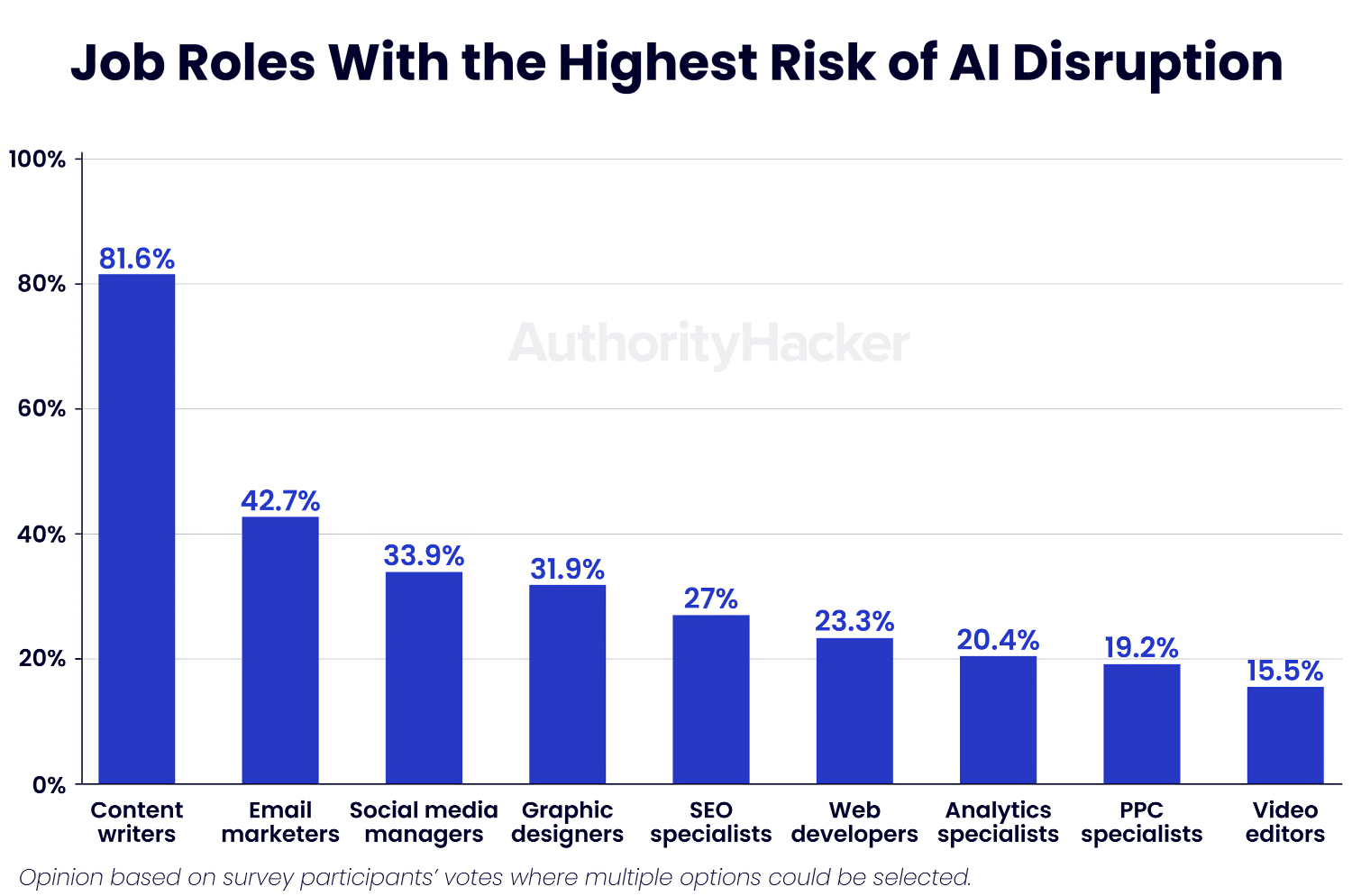
It’s a scary thought.
Those who embrace AI and learn to use it to its full capacity can truly thrive in this brave new world. Starting a blog in 2024 will definitely get you moving in the right direction. That’s because bloggers who don’t jump on AI now will lose out to the many who do.
And the adoption curve is quite real. According to our affiliate marketing statistics page, 79.3% of affiliate marketers are already using AI to create content.
Our own Gael Breton discovered in January 2023 that CNET had already used AI to write nearly 75 financial explainers…in just two months!
But it’s still early, and AI can give you a big leg up on the competition.
Let’s say you’ve decided to start a blog, but you’re not sure which niche to tackle. You can ask ChatGPT to help you pick:
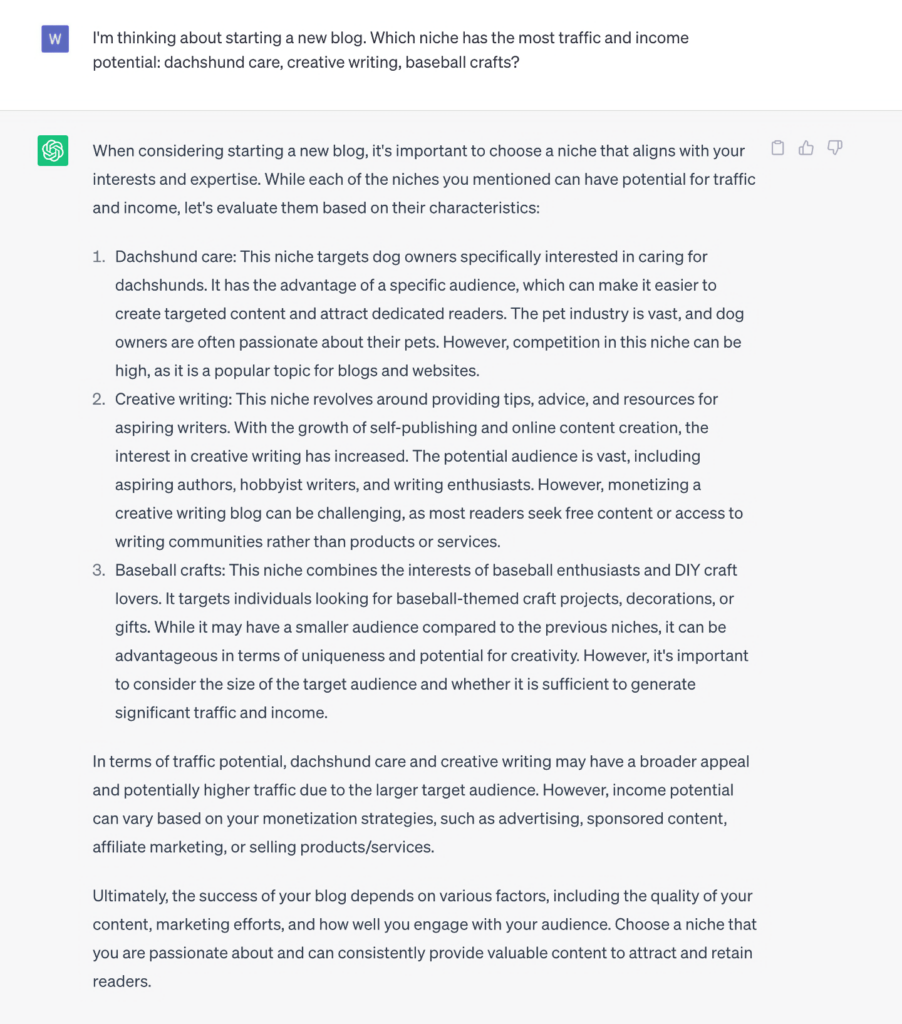
From this high-level advice, you can create more specific prompts:
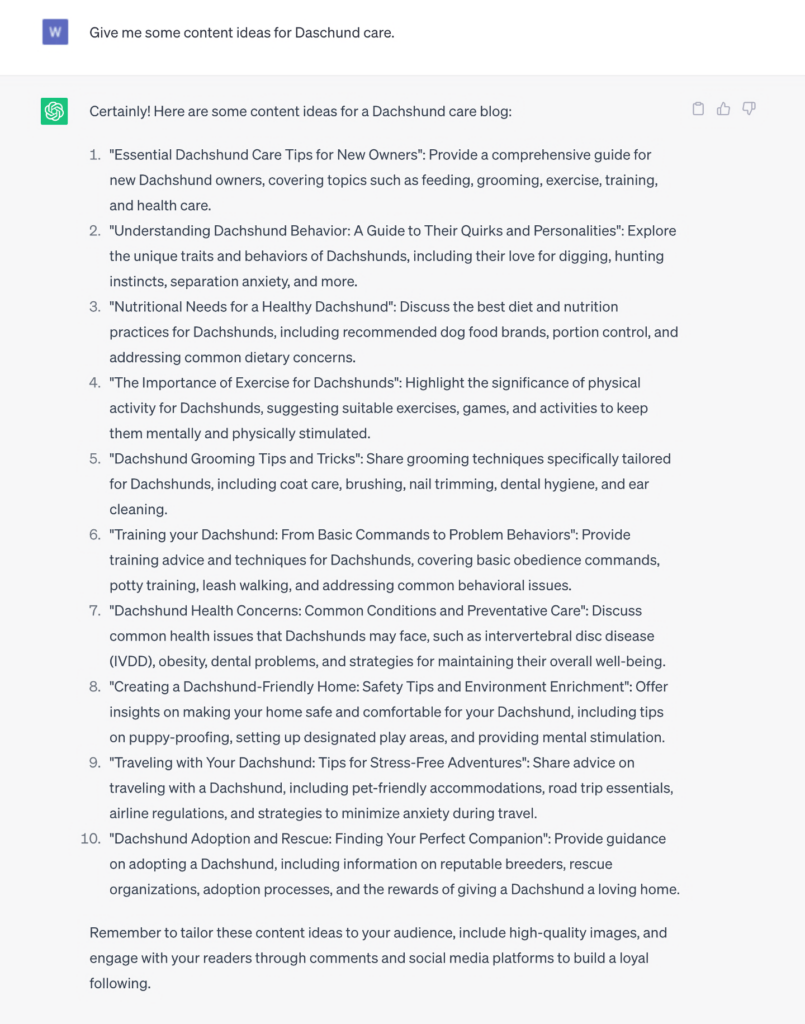
Keep honing your questions until you have a complete content plan for your blog. AI can even help you outline each post and tell you which keywords to include.
Before you know it, you’ll be publishing quality content faster than you ever thought possible.
Most importantly, you won’t get left behind by the AI revolution.
👉 Check out our 149 AI Statistics
2 Grow (and Keep) Your Audience
An engaged email list will be one of the most valuable assets you ever build online.
If a Google penalty tanks your site’s traffic, you can still send content to your list. And even if your top affiliate program disappears tomorrow, you can still sell other products and services directly to your list.
But just how do you go about growing your list in the first place?
While folks use all sorts of tactics to gather email addresses, it’s tough to beat your own blog as a source of quality sign-ups.
If you consistently publish search engine friendly content that satisfies user search intent, the search engines will send you plenty of traffic. And it’s not just any traffic – these are readers actively engaging with your articles.
That’s where lead magnets come in. Reward them with free, valuable, engaging content and then give them an incentive to sign up: a content upgrade, a free book, an email course.
You have full control over the call-to-action (CTA) on your own blog, too. That means you can test and tweak your freebie offerings and CTA design to really optimize your conversion rate.
Using these tactics, we’ve generated over 200,000 email subscribers here at Authority Hacker.

👇 Check out the recent Authority Hacker podcast for lessons learned from collecting all these emails.
3 Build Your Content Empire
To grow a successful blog, you’ll need to create plenty of engaging and helpful articles. Target the right keywords and take care of your SEO ranking factors, and those blog posts will pull in lots of organic traffic.
But beyond drawing visitors to your site, your blog content can work for you in countless other ways. In fact, you should consider your blog to be the hub of your own little online content empire.
Here are just a few of the ways you can repurpose your content:
- Break a post into a series of Tweets.
- Turn an article into a YouTube video.
- Syndicate your blog on a high-profile site like Medium.
- Reformat a series of posts into a book.
You can also directly embed social media content on your blog, using SEO traffic to grow your social profiles.
Kevin Espiritu from Epic Gardening was one of the first bloggers to use this technique, leveraging organic blog traffic to grow huge followings on YouTube, Instagram, TikTok, and Facebook:

4 Showcase Your Expertise
You may not see yourself as an expert, but undoubtedly you know more about certain topics than most. That valuable knowledge is worth sharing, and blogging can be a great way to showcase that expertise.
In fact, publishing a steady diet of actionable content that helps your audience learn more about your blog niche will start to position you as an authority in your field. As trust with your audience grows, they’ll crave more — paving the way for selling in-depth products like ebooks or online courses and even landing consulting gigs or a book deal.
Google openly values experience, expertise, authority, and trustworthiness (E-E-A-T) in content rankings.
Simply put, demonstrating your know-how increases your chances of ranking well and making money from your blog.
5 Establish Your Personal Brand
As you build your blog and gain trust in your niche, you will become more visible online. In time, readers will seek you out for your expertise and your unique perspective. The more of these dedicated readers you attract, the stronger your personal brand becomes.
And a strong personal brand can serve as a shield against the challenges of building and keeping an audience amid constant change.
Take sportswriter Joe Posnanski for example: He earned a reputation as a baseball expert at media outlets like Sports Illustrated over the course of a couple decades.
When he left big media to launch his JoeBlogs newsletter on Substack, thousands of loyal readers followed him.

6 Make Money with Your Passion
Of course, one of the most compelling reasons to start a blog is that you can make money doing something you love. Few businesses can compare to blogging when it comes to offering a diverse range of possible income streams. Some of the most popular revenue-generating methods in the blogging community include:
And that’s only scratching the surface.
In our post on how to monetize a blog, we dive deep into these and many other income sources to help you decide which ones might fit best with your new blog.
Need inspiration? Check out the Imperfect Idealist. Lily Fang writes about sustainability, running, fashion, and travel. She also shares information about her revenue streams.
A snapshot of Lily’s periodic blog income reports gives you a real-life glimpse of just how diversified blogging income can be:
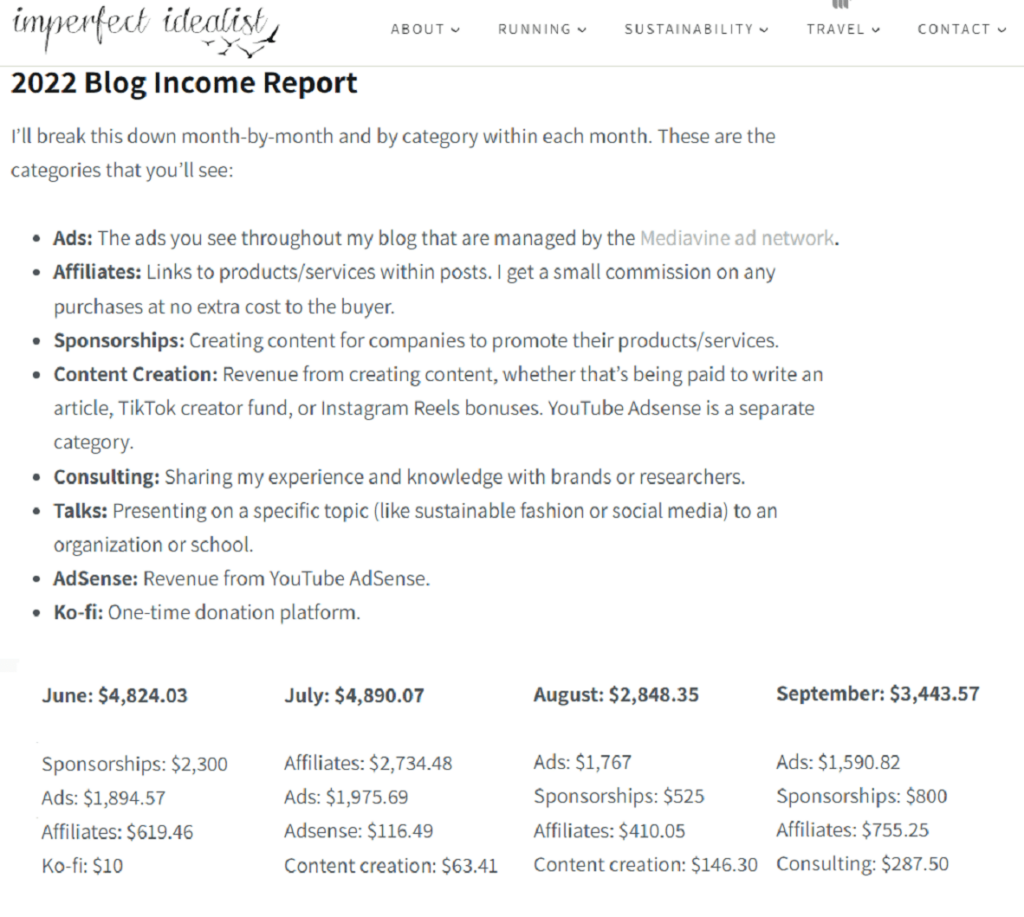
7 Improve Your Writing and Communication Skills
Solid writing has always been crucial for communicating well in just about every setting and field of endeavor. Today, with so many people spending ample time online reading articles, email, Slack channels, and social media threads, good writing matters.
The internet is a noisy place, for sure, but blogging can help you connect with like-minded people, hone your critical writing skills and stand out from the crowd. And when you learn to communicate effectively online, you never know who will be reading or what doors may open up for you.
As writer Jeff Goins puts it:
Blogging helped me find my voice and connect with others around the world who resonated with what I had to say.
8 Build an Asset
As we saw above, you can earn money blogging in a lot of different ways. But a profitable blog is also an asset that you can sell down the road if you want to.
According to Mushfiq Sarker at The Website Flip, websites typically sell for about 30 times their monthly profit. That number can go up or down depending on factors like site age, niche, and income trends, but it’s a useful rule of thumb.
These days, the multiplier usually falls in the 27-32X range.
So, a site making $1000 a month might sell for $27,000-$32,000. That sort of return makes it clear that your blogging journey can actually be a solid long-term financial investment.
If you want to see some real-life examples of the prices blogs can command, take a look at the listings on website marketplaces like Empire Flippers, FE International, and even Flippa.
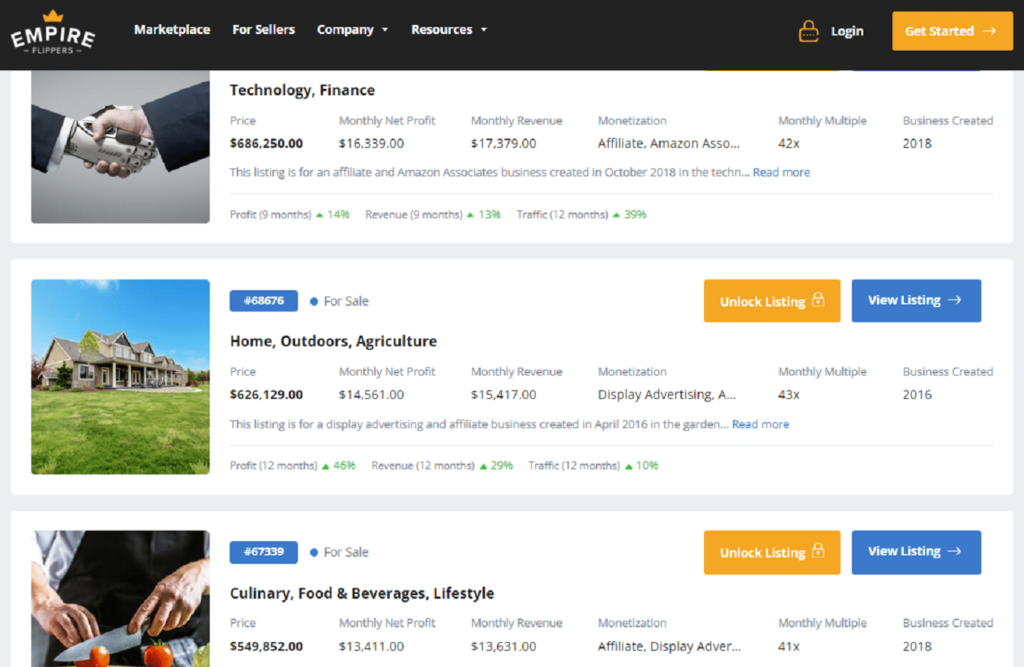
👉 Check out our [Case Study] How We Sold An 18-Month-Old Site For Mid 6 Figures
9 Experience Personal Growth and Gain Confidence
Building a successful blog can be very motivating and make you feel more confident about your ability to achieve your goals.
But to get there, you will probably need to develop new skills and habits, and maybe even change your mindset. And research shows it can take 18 to 154 days to make a new habit stick.
That’s one of the reasons the blogging community has embraced content challenges in recent years.
The format varies, but the gist is that you commit to producing one piece of content every day for the duration of the challenge – usually 30, 60, or 90 days.
This type of content challenge is obviously a great way to jumpstart your new blog. It also gives you the chance to engage with other bloggers just starting their own content marketing journeys.
And, of course, writing a new post every day helps lock in your new writing habit and motivates you to keep going.
10 Become More Organized and Productive
If you want to build a successful blog today, you’re going to have to improve your organizational skills and figure out how to be as productive as you can. You’ll be publishing a lot of content, after all. Eventually, you may also need to manage various social media accounts, an email list, and even other writers.
Along the way to success, you will figure out which tools and methods work best not just for your blog but for your personality.
And don’t be surprised if these techniques seep into other areas of life. You might just become an all-round more productive individual, too.
For instance, Trello is popular among bloggers and content teams for managing content schedules. But many have adopted it to organize personal tasks, too. Engineer Mitchell Fry created a personal productivity Trello template, used by over 80K people:

11 Make a Difference
The most successful blogs solve readers’ problems. If you can do that, you’ll pull in lots of traffic and have plenty of opportunities to make money. Helping others through your content not only brings them satisfaction but also adds meaning to your work.
A great example of a blog that makes a difference for its readers is The Write Practice.
Author Joe Bunting created the site several years ago to teach other writers about their craft and the writing business. Its practical approach provides hands-on exercises and invites reader interaction in the comments.
Today, The Write Practice boasts an email list of more than 450,000 subscribers and generates great engagement with every post:
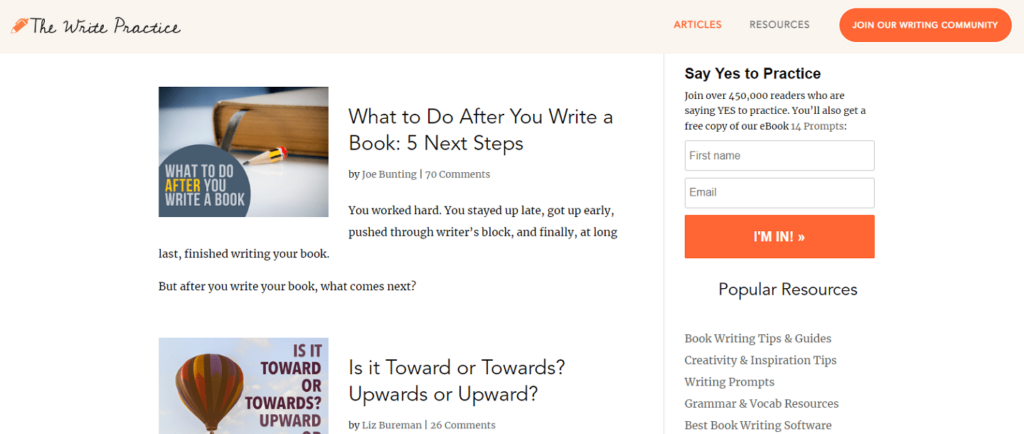
Joe is clearly making a real difference for his core audience of authors trying to level up their writing skills.
5 Reasons Not to Start a Blog
Even though there are still many great reasons to start blogging in 2024, the truth is, it’s not for everyone. You need to consider the drawbacks to starting a blog, too.
To help you think through the other side of the equation, here are a few reasons you might decide not to start a blog.
1 Balancing Work and Personal Life
While some bloggers earn a full-time income, most start a blog as a side hustle. That means you’ll probably still be working your “day job” while trying to build your blog. And if you study successful bloggers, you’ll notice a pattern.
Most of them spent several hours each night and a big hunk of each weekend on their side hustle when they first started blogging. All of those extra hours spent working come at the expense of family and leisure time. And that can turn your blog into a real grind.
There’s no doubt that hard work and dedication can take you a long way. But as Bryan E. Robinson Ph.D., reminds us in Psychology Today, the hustle culture can be dangerous to your mental health and, ironically, can even sap your productivity.
2 Requires Continuous Adapting
Even if you build a successful blog that ranks well and makes money, your job is not finished. In fact, running a blog requires you to continue learning and adapting basically forever.
Google’s algorithm is constantly changing and new competitors enter the field all the time. As a result, gaining and retaining search engine rankings is a constant battle.
Blogging technology changes all the time, too, from sweeping WordPress updates to the explosion of AI tools that are shaking up all aspects of life.
As a blogger, you have to keep up with these changes and figure out how to use them to your advantage. Otherwise, you’ll get left behind.
Regulations change, too, and your site has to adapt over time to remain compliant. For instance, the United Nations reports that 80% of countries have privacy laws in place or under consideration.
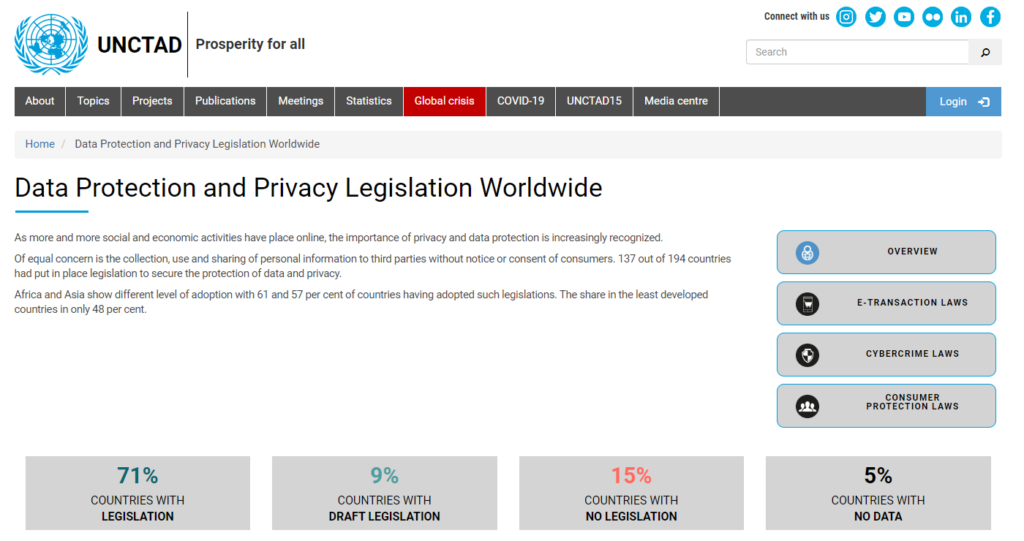
The bottom line is, you can’t take a set-it-and-forget-it approach to your blog.
3 Competition Is Tougher than Ever
In the early days of blogging, it wasn’t too tough to find a niche that was light on solid content. You could become an authority pretty quickly by publishing a series of articles that covered the basics.
Today, though, there is tough competition in just about every niche you can imagine. And AI-generated content means that creators at all levels can scale their blogs quickly.
For example, SEO Julian Goldie provided some details on his efforts to scale chipperbirds.com in a recent Twitter thread. The Ahrefs graphs tell a pretty compelling story:

That’s 4000 new organic keywords ranking in the course of a month.
And that’s just one site. You can be sure the same sort of scaling is happening all across the blogging world.
So, not only do you need to constantly learn new skills, like how to use AI tools, you also need to work really hard to create content that stands out.
4 Blogging Is Not a Get-Rich-Quick Scheme
If you’re hoping to make a lot of money in a short amount of time, then starting a blog is probably not the right path for you.
Michal Ugor recently did a deep dive into about 2 million search results to figure out how long it takes to rank on Google. While the answer can vary depending on niche and other factors, it generally takes months or years to win a top ranking.
And solid Google rankings are one of the key factors for driving traffic for most blogs.
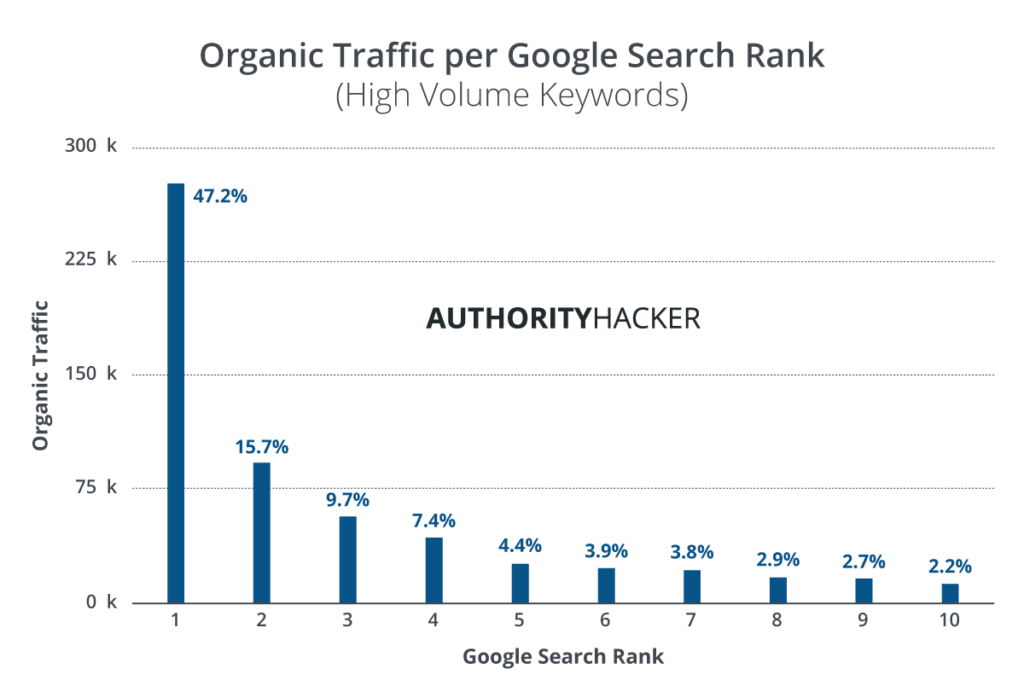
On average top result gets the 40% of aggregate organic traffic. For keywords that matter (i.e. >1000 searches a month) the figure goes up to 47%.
Solid and consistent traffic, in turn, is usually a requirement for making money from your blog. Ads, affiliate marketing, and the other income streams we talked about above all depend on visitors reading your content.
In most cases, it takes a long time to see decent financial returns after you start a blog.
5 You Like Something Else Better
Sometimes blogging isn’t a good fit simply because you don’t like the work.
After all, you’re going to be spending a lot of time writing blog posts, at least in the beginning. And if you can’t stand to write, that work will be drudgery.
The good news is, there are plenty of other online models for making money, including dropshipping, ecommerce, podcasting, YouTube, and many others.
A great example of a creator who found success outside of blogging is ASMRtist Ephemeral Rift, whose YouTube channel is thriving:

With more than a million subscribers and several videos with more than a million views each, it’s clear that “Uncle Rift” found the right platform for his work.
Why start a blog when YouTube seems to fit him so well?
Conclusion
Even in 2024, blogging can still be a profitable and potentially life-changing endeavor.
There aren’t many other outlets that give you the creative freedom that blogging offers while also allowing you to improve other people’s lives.
But starting a blog is also more challenging than ever, and the landscape gets more crowded every day. So weigh the pros and cons of blogging carefully, then make the best decision for your situation and personality.
If you do decide to start a blog, though, be patient. Especially if you’re just launching your first blog, success won’t come overnight.
But blogging success is definitely still possible. And you just might learn some valuable life lessons along the way.
And speaking of lessons, I highly recommend you attend our free training if you want valuable advice on starting a blog the right way.



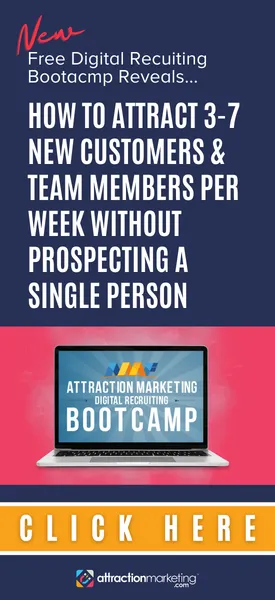









Leave a Reply